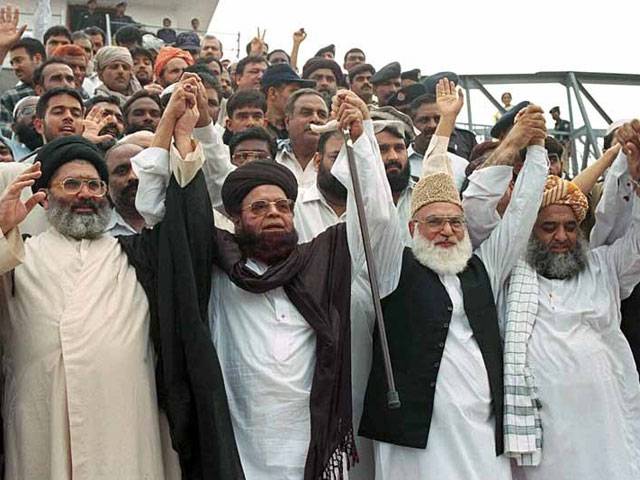LAHORE – The term ‘unity’ that had been the hallmark of the disbanded Muttahida Majlis-e-Amal has lost its relevance these days, as religio-political parties belonging to all schools of thought have failed to forge a grand alliance for the electoral test ahead.
All these theocratic groups call for the enforcement of Islamic Shariah, but the strategies they have chalked out make them dependent on other leading parties, such as the PML-N, PPP and PTI, who they have nothing in common otherwise.
Observers believe the tussle between the Jamaat-e-Islami and the Jamiat Ulema-e-Islam-Fazl has been the major stumbling block in revival of the Muttahida Majlis-e-Amal or formation of any such alliance. Not surprisingly, the Jamaat-e-Islami is eying a seat-adjustment deal with the PML-N and the Jamiat Ulema-e-Islam-Fazl also with the same group.
In the recent past, the JI was learnt to have reached an electoral agreement with the PTI, but later it backed out. Reports say some top JI leaders were desirous of making a seat-adjustment accord with the PML-N due to which the party kept its distance from the PTI. Up till now, the JI has struggled to reach a final decision as regards who to ally with. A senior JI leader nevertheless says his group is in contact with other religious parties and the announcement of a formula to this effect is expected shortly.
JI’s Dr Farid Ahmed Paracha says the MMA was formed because of the efforts his party had put in. “Only the JI has the ability to gather religious forces under a single platform because it knows no sects,” he says while adding, “The MMA got split due to the obduracy of a party that deemed itself superior to the other groups in the alliance.”
Contrarily, JUI-F’s central leader Maulana Muhammad Ajmad Khan says his party did struggle for revival of the MMA for over two-and-a-half years, but it failed as some zealots were not serious. “Religious parties are still our first priority for seat adjustments; we have been trying to save the ‘religious vote’ from division by mounting efforts to make sure that candidates from religious parties do not come face to face in the forthcoming elections,” says Ajmad Khan.
Nevertheless, reports pouring in suggest that the JUI-F is also interested in reaching an electoral arrangement with the PML-N rather than any other religious party. Maulana Fazlur Rehman’s interaction with the media at Allama Iqbal International Airport in Lahore a few days ago gives an indication of this intent.
Likewise, the Jamiat Ulema-e-Pakistan, another major religio-political force, has not announced any alliance with any religious party yet. JUP President Sahibzada Abu-Al-Khair Muhammad Zubair meanwhile met with JI chief Munawar Hasan in Mansoora area of Lahore on Saturday and headed into talks over seat adjustments. Both the leaders agreed on saving the division of the religious vote. The JUP president suggested that a meeting of MMA ally parties from Punjab be called to evolve a formula for seat adjustments.
According to JUP leader Qari Zawar Bahadur, in the current political scenario, the religious parties are not fighting a battle of ideology, but are in a struggle for gaining access to power corridors. He however hopes candidates from different religious parties will not encounter each other in the next polls.
In 2002, religious parties including, the Jamiat Ulema-e-Islam-Fazl, Jamaat-e-Islami, Jamiat Ulema-e-Pakistan and Tehreek-e-Jafaria Pakistan formed MMA and contested the 2002 general elections with a 15-point manifesto promising to make Pakistan a true Islamic welfare state. The MMA formed the government in Khyber Pakhtunkhwa as well as lead the coalition government in Balochistan.
The MMA became non-functional after a disagreement over participating or boycotting the 2008 general elections. Different religious parties have been claiming to work for revival of the MMA at their best since.
Thursday, April 18, 2024
Religious parties in solo flights

Arshad Bhatti
1:55 PM | April 18, 2024
Stefanos Tsitsipas advances in Barcelona
4:19 PM | April 18, 2024
Met Office predicts more rains across country till April 29
2:51 PM | April 18, 2024
Punjab changes school timings for summer season
1:55 PM | April 18, 2024
Enemies of Pakistan are unable to digest investment in the country: Ataullah Tarar
1:29 PM | April 18, 2024
IHC restores Bushra Bibi's appeal for shifting to Adiala Jail from Bani Gala
1:24 PM | April 18, 2024
Hepatitis Challenge
April 18, 2024
IMF Predictions
April 18, 2024
Wheat War
April 18, 2024
Rail Revival
April 17, 2024
Addressing Climate Change
April 17, 2024
Justice denied
April 18, 2024
AI dilemmas unveiled
April 18, 2024
Tax tangle
April 18, 2024
Workforce inequality
April 17, 2024
New partnerships
April 17, 2024
ePaper - Nawaiwaqt
Advertisement
Nawaiwaqt Group | Copyright © 2024





